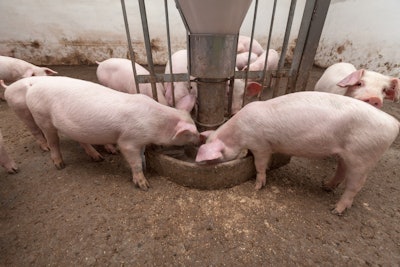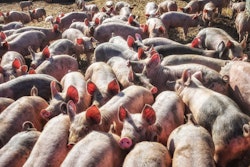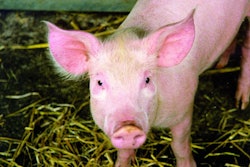
Among the recent outbreaks of African swine fever (ASF) to be confirmed in Europe are two affecting commercial farms in northwestern Italy and in the North Caucasian district of Russia. Also, as the number of confirmed ASF cases in Sweden’s wild boar population creeps up, more countries are joining a ban on imports of Swedish pork.
In Europe, the total number of confirmed ASF outbreaks in domestic pigs has reached 2,443.
Covering the European Union (EU) member states and immediate neighbors, this is according to the Animal Disease Information System of the European Commission (EC; as of September 8).
Since the previous update released in the previous week, the total has risen by 121, while the number of countries with confirmed outbreaks remains at 16.
For comparison, 12 European states registered a total of 537 outbreaks in this population with the EC in the whole of 2022. Of these, 329 occurred in Romania.
Registering the highest number of outbreaks in domestic pigs with the EC so far in 2023 is now Croatia, with a total of 669 outbreaks — an increase of 80 from the previous week. Next come Romania (590 outbreaks), Bosnia and Herzegovina (570), and Serbia (508). For the latter two states, the figures have not been updated since last month. Next highest national totals are a long way behind these Baltic states.
In Bosnia and Herzegovina, the high number of outbreaks belies the now-declining intensity in ASF infections, reported Sarajevo Times last week.
According to the veterinary head for the government in Brcko, 209 farms in this district alone have been hit by ASF. Around 7,300 pigs have been culled as a result. However, the official said that outbreaks are now likely to become more sporadic.
Between the country’s first reported cases in June and early August, a total of 577 ASF outbreaks have been confirmed in the Republic of Srpska and the Federation of Bosnia and Herzegovina, as well as the Brcko district. While infections have occurred in seven wild boar, the overwhelming majority of outbreaks have affected the nation’s backyard pig owners.
Italy, Russia confirm ASF outbreaks on farms
For Italy, confirmation of an ASF outbreak at a commercial farm in the Lombardy region is the country’s largest so far to affect domestic swine.
Just over 7,400 pigs were kept at the premises in the province of Pavia until the presence of the ASF virus was detected at the end of August. This is according to the official notification to the World Organisation for Animal Health (WOAH). The farm is located in the same area as a number of previously reported outbreaks on premises described as “farms.”
Previous ASF infections in Italy have been identified only in small herds of domestic swine in this part of northwestern Italy, as well as in Lazio and Calabria. There have also been many cases in the wild boar population in these regions and Campania.
The EC System does not cover the disease situation in Russia. However, in the Krasnodar region in Russia’s North Caucasian federal district, the ASF virus was detected at a large commercial farm.
According to the latest WOAH report from the national veterinary authority, five of the 40,667 pigs at the premises showed signs of the disease. Since the end of August, ASF has been confirmed at four farms in this region.
Backyard herds hit in 3 European states
Furthermore, there have been two more outbreaks in Russia's Central federal district. These affected two backyard herds in the regions of Kursk and Tula, according to official notifications. For Tula, the latest cases are the first since September 2021.
Over the past week, Romania’s animal health agency has officially registered with WOAH a further 46 outbreaks in backyard herds. Directly impacted through mortality or culling were a total of 262 swine.
Meanwhile, total ASF outbreaks among domestic pigs in Poland so far this year has risen to 25.
According to Poland’s chief veterinary office, the country’s three most recent outbreaks started in the period September 14-15 in the same village in the central-western province of Greater Poland (Wielkopolskie). Affected were herds of 32, 44, and 441 pigs.
ASF confirmed in wild boar in 20 European states in 2023
Up to September 8, the total number of ASF outbreaks across Europe has reached 6,160, according to EC’s information system.
This the latest total from 20 countries registering one or more outbreaks through this system since January 1. This figure now includes Sweden, where the country’s first ever ASF cases were detected in wild boar at the end of August.
Since the EC’s previous update dated September 1, 12 states have reported new ASF cases in this population.
Registering the highest number of outbreaks in this category so far this year is Poland with a total of 2,203. Following are Germany (now with 832 outbreaks in the wild population), Italy (788), Latvia (526), Slovakia (499) and Hungary (352).
In addition to these seven nations, also reporting further ASF outbreaks to the EC System since the previous update were Croatia, Estonia, Lithuania, North Macedonia and Romania.
For comparison, there were a total of 7,442 outbreaks of ASF in wild boar across 15 European countries covered by the EC System in the whole of 2022.
Sweden: more wild boar test positive, trade bans
Latest notification to WOAH from the animal health agency in Sweden puts the number of confirmed ASF cases at 20.
So far, all have been in wild boar, and within the initial core zone, according to the Swedish Veterinary Institute, SVA. The zone is centered on the municipality of Fagersta in the county of Västmanland. From the WOAH notifications, it appears that one infected wild boar has been found in an adjacent municipality.
Monitoring of wild boar across the country has so far only identified the reported cases in the core zone, reports SVA. In recent days, authorities and hunters have been searching for, and sampling, carcasses of dead animals.
Source of the ASF virus in Sweden remains uncertain. As the cases are at a location far from the nearest known outbreak, human activity is thought to have played a part.
On news of the ASF cases, several countries have announced an immediate ban on imports of Swedish pork. According to ScandAsia, these include Taiwan, the Philippines and Singapore.
Meanwhile, the Swedish Meat Industry Association assured media about the safety of the nation’s pig meat. Its managing director said that the import bans are unreasonable, but they are a standard response when ASF is detected in a country — even if only wild species are affected. Such trade restrictions can be very damaging to the pig sector, he said.
British pig industry calls for border controls
So far, the United Kingdom (U.K.) remains free of ASF. However, uncertainty over how the virus recently arrived in Sweden has prompted renewed calls for better controls on imports of pig meat and other potentially infected products by industry associations.
A further concern is the first reported outbreak at a commercial farm in northern Italy, according to the National Pig Association (NPA).
After the country’s decision to leave the EU, the government has repeatedly delayed the introduction of full checks on incoming goods at the country’s ports, airports and postal centers.
In recent days, the NPA has again called on the government to put in place the necessary measures to protect the U.K. borders, and demonstrate a commitment to prioritizing national biosecurity.
Last month, the British Veterinary Association warned of the possible adverse consequences to animal health of further delays to the implementation of the government’s Border Target Operating Model.
Already in October 2022, the NPA and elected representatives called on the U.K. government to increase border controls because of the threat posed by imports of contaminated meat.
One month previously, the U.K. government had introduced measures to limit the amount of pig meat that could be brought into the country by individuals without any checks.
View our continuing coverage of the global African swine fever situation.

















